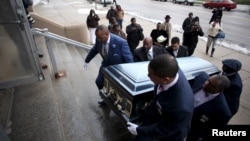President Donald Trump says he's ready to “send in the Feds” if Chicago can't reduce its homicide problem, and the city's police superintendent says he is “more than willing” to work with the federal government to combat the violence.
Trump tweeted Tuesday night: “If Chicago doesn't fix the horrible ‘carnage’ going on, 228 shootings in 2017 with 42 killings (up 24 percent from 2016), I will send in the Feds!”
In response to the president's tweet, Police Superintendent Eddie Johnson reiterated that the city is receptive to assistance from the Department of Justice, the FBI, the Drug Enforcement Administration and the Bureau of Alcohol Tobacco and Firearms. He also repeated that city officials have sought a “boost” in federal prosecution rates for gun crimes in Chicago since homicide figures spiked.
Trump offered no details on what federal intervention would look like, though many of the conceivable options would pose practical and constitutional obstacles.
The most direct - and most extreme - intervention would be sending National Guard troops. But a federal statute dating to 1878 prohibits the deployment of federal troops to do the jobs of domestic police, with some narrow, rarely invoked exceptions.
Mayor Rahm Emanuel, in an interview with WTTW's “Chicago Tonight” on Tuesday, said he welcomed government help in the form of more money to hire officers and more resources to track the flow of illegal guns into Chicago.
Emanuel, a Democrat who once worked as former president Barack Obama's White House chief of staff, also mentioned support for after-school and other social programs.
“The federal government can be a partner, and to be honest they haven't been for decades,” he said.
Trump's tweet came a day after Emanuel criticized Trump for worrying about the size of the crowd at his inauguration. Emanuel has acknowledged his own frustration with Chicago's crime rate.
The figures cited by Trump are the same as those published Monday in the Chicago Tribune. The tweet was posted about the time Tuesday evening that the figures were cited on Fox television's “O'Reilly Factor.”
The numbers were slightly different from the latest tally by the Chicago Police Department. As of Tuesday, police said, 234 people have been shot in 2017, including 38 who died. At this point last year, 227 people had been shot, including 33 deaths.
Department spokesman Anthony Guglielmi explained that the department's numbers are slightly different because they do not include officer-involved shootings, shootings that were considered “justified,” such as those that were in self-defense, and shootings that were investigated by state police because they occurred on expressways.
It appears that the president's numbers for homicides came from the county's medical examiner's office, Guglielmi said.
Earlier this month, before he took office, Trump tweeted that Emanuel should ask for federal help if he isn't able to bring down the number of homicides. Last year, the death toll soared to 762 - the most killings in the city in nearly two decades and more than New York and Los Angeles combined.
In Tuesday's tweet, Trump did not offer specifics about how the federal government could help. The White House website says: “Our country needs more law enforcement, more community engagement and more effective policing.”
Rep. Luis Gutierrez, a Chicago Democrat, criticized Trump, suggesting in a statement that the president, whom he called the “tweeter-in-chief,” would “rather spend his time on Twitter” than look for ways to reduce gun violence.
“The president wants publicity and to be seen beating up on Democratic elected officials and appearing hostile to a big city like Chicago in the eyes of his suburban and rural voters,” Gutierrez said, adding that he does not believe the president “will do anything constructive to get cheap handguns off the streets of American cities.”
Another Chicago Democrat, Rep. Mike Quigley, called Trump's threat “reckless and misguided” and a “gross overreach of federal power.” He called on the president to increase funding for federal programs that he said were cut by Republicans but would help local law enforcement. He also called on Trump to support “commonsense, pragmatic gun laws.”




